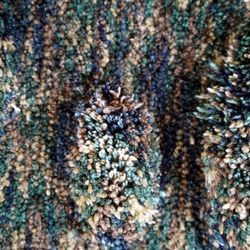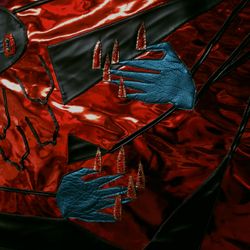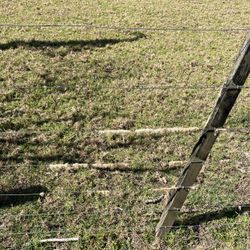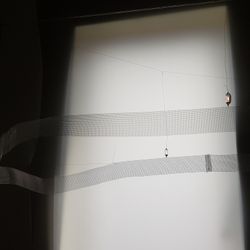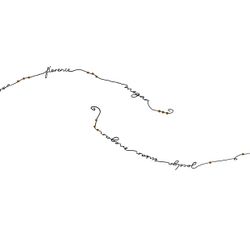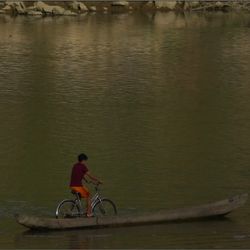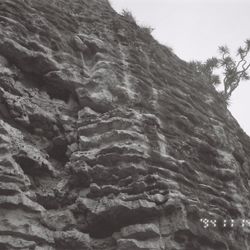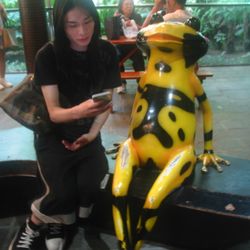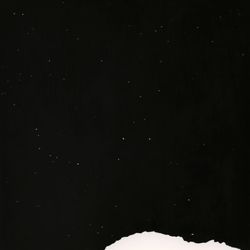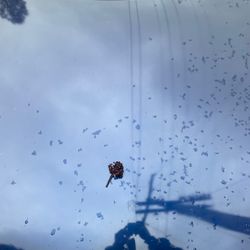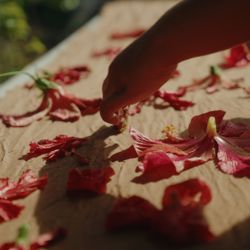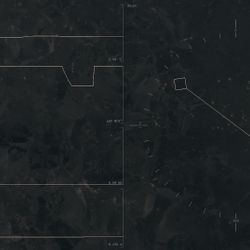Miranda Bellamy, Kate Belton, Mark Bolland, Sophie Jerram, Mizuho Nishioka, Karim Sahai, Johnathon Titheridge, Sebastian Warne and Jane Zusters.
Past Exhibition
Tūrei 6 Noema -
Hātarei 1 Tīhema
Tuesday 6 November -
Saturday 1 December
2012
Image: OR The Land Show, We’re not getting out of here alive, curated by Jamie Hanton, 2012.
Curated by Jamie Hanton
We're not getting out of here alive OR The Land Show is a group exhibition with two titles. While one gestures towards a vague and seemingly hyperbolic threat concerning human extinction, the other is simply a prosaic evaluation of the content of the exhibition. The two are, of course, closely related. The exhibition draws on Timothy Morton’s contention in Ecology without Nature that:
“Nobody likes it when you mention the unconscious... because when you mention it, it becomes conscious. In the same way, when you mention the environment, you bring it into the foreground. In other words, it stops being the environment. It stops being That Thing Over There that surrounds and sustains us. When you think about where your waste goes, your world starts to shrink.” (Ecology without Nature, Harvard University Press, 2006, p.1)
In this respect, the work selected for the exhibition is more about the way we perceive, discuss, and record our relations with the land than the land itself. Our daily consumption of images of land - whether it is a picturesque landscape in a tourism advertisement, or a dramatic image of the aggressive power of land in a news report - is marked by the passive positioning of the spectacle and viewer. Visual art is often as guilty of pandering to a never sated nature fetish. The work in We’re not getting out of here alive OR The Land Show , however, explores the tension between this static appreciation of the land and a more active / social involvement with ecological activism.
By highlighting the drastic and irreversible actions others have taken in their attempts to claim a proprietary or capitalistic dominion over the land we are left to contemplate what might be done in response. As Morton so succinctly puts it: “On some days, environmentalist writing seems like patching up the void with duct tape.” The two questions asked again and again are: How do we talk about the land without spiraling into fatalistic cynicism? and How can art enter this conversation in a meaningful way?
Click to download exhibition text by Loveday Why (PDF)
Image: We’re not getting out of here alive, OR The Land Show, curated by Jamie Hanton, 2012.
Image: Johnathon Titheridge, 'Spinning Broccoli for cheap effect', 2011-2012, recycled record player case, walnut veneer, felt, brass handles/knobs, plastic garden spike, multi ratio gearbox, AA/AAA Batteries, 4 x 1.5volt bulbs, spy camera.
Image: Johnathon Titheridge, 'Spinning Broccoli for cheap effect', 2011-2012, recycled record player case, walnut veneer, felt, brass handles/knobs, plastic garden spike, multi ratio gearbox, AA/AAA Batteries, 4 x 1.5volt bulbs, spy camera.
Image: Sophie Jerram, 'Men of the land series', 2012, photographic print on corflute and PVC.
Image: Miranda Bellamy, 'Achilles Violin', 2011, HD Projection loop. Foreground: Sebastian Warne, 'San Xia Daba 1981 - Present', 2012, polythene, digital print on banner and hot glue. Right: Jane Zusters, 'River Road Red Zone', 2012, DVD loop.
Image: Left: Mizuho Nishioka, 'One third of a picture / Point #04', 2012, pigment inks on baryta rag paper. Right: Mark Bolland, 'Lovers’ Leap', 2012, transparency on lightbox.
Image: Sophie Jerram, 'Men of the land series', 2012, photographic print on corflute and PVC.
Image: Mizuho Nishioka, 'One third of a picture / Point #04', 2012, pigment inks on baryta rag paper.
Image: Kate Belton, 'Palimpsest', 2012, HD Video loop.
Image: Karim Sahai, 'The North Korean Village of Kijong-dong', 2012, digital pigment print on Hahnemuhle and analog photograph on colour infrared film.
Image: Sebastian Warne, 'San Xia Daba 1981 - Present' (detail), 2012, polythene, digital print on banner and hot glue.
Image: We’re not getting out of here alive, OR The Land Show, curated by Jamie Hanton, 2012.
Image: Johnathon Titheridge, 'Spinning Broccoli for cheap effect', 2011-2012, recycled record player case, walnut veneer, felt, brass handles/knobs, plastic garden spike, multi ratio gearbox, AA/AAA Batteries, 4 x 1.5volt bulbs, spy camera.
Image: Johnathon Titheridge, 'Spinning Broccoli for cheap effect', 2011-2012, recycled record player case, walnut veneer, felt, brass handles/knobs, plastic garden spike, multi ratio gearbox, AA/AAA Batteries, 4 x 1.5volt bulbs, spy camera.
Image: Sophie Jerram, 'Men of the land series', 2012, photographic print on corflute and PVC.
Image: Miranda Bellamy, 'Achilles Violin', 2011, HD Projection loop. Foreground: Sebastian Warne, 'San Xia Daba 1981 - Present', 2012, polythene, digital print on banner and hot glue. Right: Jane Zusters, 'River Road Red Zone', 2012, DVD loop.
Image: Left: Mizuho Nishioka, 'One third of a picture / Point #04', 2012, pigment inks on baryta rag paper. Right: Mark Bolland, 'Lovers’ Leap', 2012, transparency on lightbox.
Image: Sophie Jerram, 'Men of the land series', 2012, photographic print on corflute and PVC.
Image: Mizuho Nishioka, 'One third of a picture / Point #04', 2012, pigment inks on baryta rag paper.
Image: Kate Belton, 'Palimpsest', 2012, HD Video loop.
Image: Karim Sahai, 'The North Korean Village of Kijong-dong', 2012, digital pigment print on Hahnemuhle and analog photograph on colour infrared film.
Image: Sebastian Warne, 'San Xia Daba 1981 - Present' (detail), 2012, polythene, digital print on banner and hot glue.

